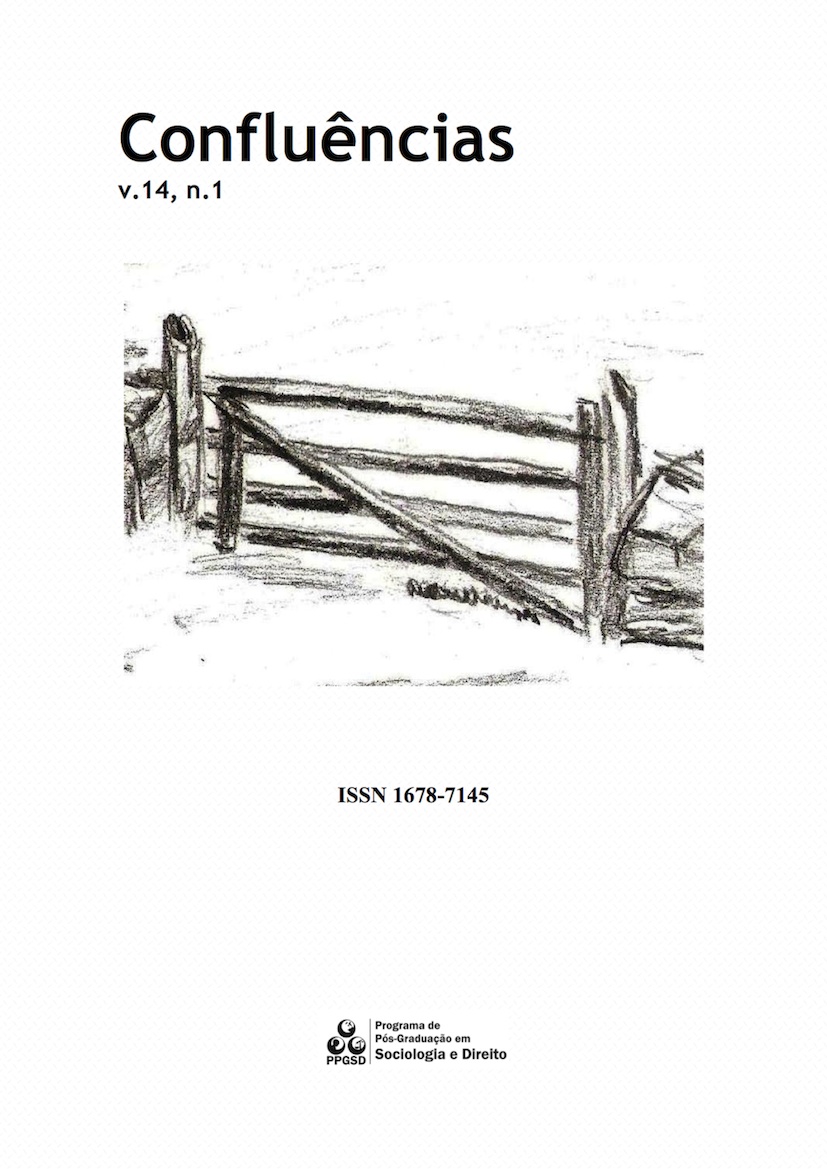THE RIGHT TO WATER IN INTERNATIONAL LAW AND BRAZILIAN LAW
DOI:
https://doi.org/10.22409/conflu14i1.p296Keywords:
Water, Human Rights, International Relations, Brazilian legislationAbstract
The objective of this study is to report the initiative of building this new human right in international relations, which effectively resulted in some statements, and to check the possibility of asserting its existence in the Brazilian legal system. For this, the work is divided into two parts, the first devoted to instruments produced in the context of international relations, the second to the Brazilian legislation.
Downloads
References
AGÊNCIA NACIONAL DE ÁGUAS. Atlas Brasil: abastecimento urbano de água: panorama nacional. Brasília:ANA, Engecorps, Cobrape, 2010.
ALLOWAY, Tracy. Willem Buiter thinks water will be bigger than oil. Financial Times, Jul 21 2012. Disponível em: www.ft.com/alphaville,30 acesso em 13/7/2012.
AMORIM, João Alberto Alves. Direito das águas: o regime jurídico da água doce no direito internacional e no direito brasileiro. São Paulo: Lex Editora, 2009.
BARAT, Josef. Infraestrutura sanitária, a marca do atraso. O Estado de São Paulo. São Paulo, 1º de setembro de 2010, p. B2.
BARLOW, Maude. Access to clean water is most violated human right. The Guardian.
London, 21 July 2010. Disponível em: http://www.guardian.co.uk, acesso em 13/7/2012.
BRASIL afirma que acesso à água não é direito humano: posição causa mal-estar na reta final
do 5.º Fórum Mundial sobre recurso. O Estado de São Paulo. São Paulo, 21 de março de
, p. A26.
BRZEZINSKI, Maria Lúcia N. L. Água doce no século XXI: serviço público ou mercadoria internacional? São Paulo: Lawbook Editora, 2009, 251 p.
BRZEZINSKI, Maria Lúcia N. L. Direito Internacional da Água Doce: fontes, regimes jurídicos e efetividade. Curitiba: Juruá, 2012. 456 p.
CAUBET, Christian G. A água, a lei, a política... e o meio ambiente? Curitiba: Juruá, 2004.
FRACASSO do saneamento. O Estado de São Paulo. São Paulo, 22 de agosto de 2010, p. A3.
GARCÍA MORALES, Anizia. El derecho humano al agua. Madrid: Editorial Trotta, 2008.
GODOY, Paulo. A caminho do retrocesso? O Estado de São Paulo. São Paulo, 30 de agosto de 2011, p. A2.
HARVEY, David. O neoliberalismo: história e implicações. São Paulo: Edições Loyola, 2008.
INSTITUTO BRASILEIRO DE GEOGRAFIA E ESTATÍSTICA – IBGE. Pesquisa Nacional de Saneamento Básico. Brasília: IBGE, 2010.
KURZ, Robert. Paradoxos dos direitos humanos. Folha de São Paulo. São Paulo, 16 de março de 2003.
MCCAFFREY, Stephen. Water, human rights and sustainable development. In: CANÇADO
TRINDADE, Antonio Augusto. Derechos humanos, desarollo sustentable y medio ambiente/ Human rights, sustainable development and the environment/ Direitos humanos, desenvolvimento sustentável e meio ambiente (Seminário de Brasília de 1992), Instituto Interamericano de Derechos Humanos y Banco Interamericano de Desarrollo (BID), San José
de Costa Rica/Brasília, Brasil, 1992, p. 99-115.
MCCAFFREY, Stephen; NEVILLE, Kate. Small capacity and big responsabilities: financial and legal implications of a human right to water for developing countries. The Georgetown International Environmental Law Review, volume XXI, issue 4, Summer 2009, p. 679-704.
O ‘ATLAS’ da água. O Estado de São Paulo. São Paulo, 24 de março de 2011, p. A3.
ORGANIZAÇÃO DOS ESTADOS AMERICANOS – OEA. Projeto de Resolução “A água como direito humano”, 18/5/2012. Disponível em: www.oea.org, acesso em 25/5/2012.
PETROVA, Violeta. At the frontiers of the rush for blue gold: water privatization and the human right to water. Brooklyn Journal of International Law, v. 31, 2006, p. 577-613.
PINTO, Mauricio Esteban; TORCHIA, Noelia; MARTIN, Liber. El derecho humano al agua: particularidades de su reconocimiento, evolución y ejercicio. Buenos Aires: Abeledo Perrot, 2008.
SALOMON, Marta. Desabastecimento de água pode afetar 55% dos Municípios até 2015. O Estado de São Paulo. São Paulo, 21 de março de 2011, p. A25.
SANTOS, Carlos ; VALDOMIR, Sebastián. Situación y perspectivas en América Latina. In : INICIATIVA MERCOSUR ; PIDHDD- Plataforma Interamericana de Derechos Humanos
Democracia y Desarrollo. Agua - construcción social de un derecho humano. Montevideo : La Iniciativa Mercosur, 2008, p. 9-60.
SHIVA, Vandana. Tempestade em copo vazio. O Estado de São Paulo. São Paulo, 17 de junho de 2012, p. J6.
SIMÃO, Edna. País perde R$ 7,4 bi por ano com água. O Estado de São Paulo. São Paulo, 8 de março de 2011, p. B1.
SULLIVAN, Ruth. Investors start to tap the vital commodity. Financial Times, June 21, 2011. Disponível em: www.ft.com, acesso em 13/7/2012.
THOMÉ, Clarissa. Água não é boa em 47% das medições. O Estado de São Paulo. São Paulo, 19 de junho de 2012, p. H5.
TOSTA, Wilson. Rede de esgoto cresce em ritmo mais lento do que o da população. O Estado de São Paulo. São Paulo, 9 de setembro de 2010, p. H5.
UNESCO. Outcome of the international expert’s meeting on the right to water. Paris: UNESCO, 2009.
UNITED NATIONS; ECONOMIC AND SOCIAL COUNCIL; COMITEE ON ECONOMIC, SOCIAL AND CULTURAL RIGHTS. General Comment n. 15, 20/1/2003. Disponível em http://www.worldwatercouncil.org/fileadmin/wwc/Programs/Right_to_Water/Pdf_doct/Gener al_Comment151.pdf, acesso em 5/6/2009.
UNITED NATIONS GENERAL ASSEMBLY. Resolution adopted by the General Assembly on the The human right to water and sanitation – A/64/292, 3 August 2010. Disponível em:
www.un.org/documents, acesso em 10/9/2010. UNITED NATIONS GENERAL ASSEMBLY DEPARTMENT OF PUBLIC
INFORMATION. GA/10967: General Assembly adopts Resolution recognizing access to clean water, sanitation as Human Right, by recorded vote of 122 in favour, none against, 41
abstentions, 28 July 2010. Disponível em: http://www.un.org/News/Press/docs/2010/ga10967.doc.htm, acesso em 10/9/2010.
UNITED NATIONS HUMAN RIGHTS COUNCIL – UN/HRC. Resolution 7/22 (A/HRC/RES/7/22), 28 March 2008. Disponível em: http://www2.ohchr.org/english/issues/water/Iexpert/resolutions.htm, acesso em 10/9/2010.
______. Resolution 12/8: Human rights and access to safe drinking water and sanitation
(A/HRC/RES/12/8), 1 October 2009. Disponível em:
http://www2.ohchr.org/english/issues/water/Iexpert/resolutions.htm, acesso em 10/9/2010.
UNICEF; WORLD HEALTH ORGANIZATION – WHO. Progress on Drinking Water and Sanitation: 2012 Update, WHO/UNICEF Joint Monitoring Programme for Water Supply and Sanitation 2012.
WENECK, Felipe. No Brasil, 23% das cidades racionam água. O Estado de São Paulo. São Paulo, 20 de outubro de 2011, p. A23.







